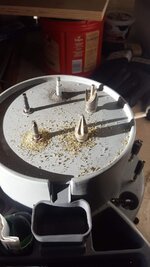- Messages
- 14,910
- Reactions
- 27,437
I have a small rectangular plastic pan that fits in my sink and a plastic colander that fits inside the pan.RVTech, What is your method?
When the brass is done I dump the brass into the colander and shake it a bit to dump the pins out and into the pan.
I let the pan fill with water and as it rises up into the colander I start adjitating the colander to wash the rest of the pins out and remaining dirty water off.
I take a SS baking pan and line it with a hand towel and dump the brass into it. I pick up the corners of the towel and kind of roll the brass around to get most of the water off then flatten the brass on the towel and set the pan on the edge of the wood stove to dry.
IF the water is still running it should have displaced the dirty water and rinsed the pins. Turn off the water and pick up the end of the pan to pour most of the water out. Take a 6" strainer (the type with a handle and two 'ears' on the rim) and line with a coffee filter. Rest the strainer on some sort of bowl and take the pan with the pins out of the sink and not unlike 'panning for gold' swirl the pins into a corner of the pan and pour the pins and remaining water into the coffee filter. Let them sit and drip dry. Pick up the coffee filter with the pins in it and set in a dry bowl and these too go on the wood stove to dry. Substitute the oven if no wood stove. Rinse your tumbler cup and lid.
Results may vary but this works very well for me.













